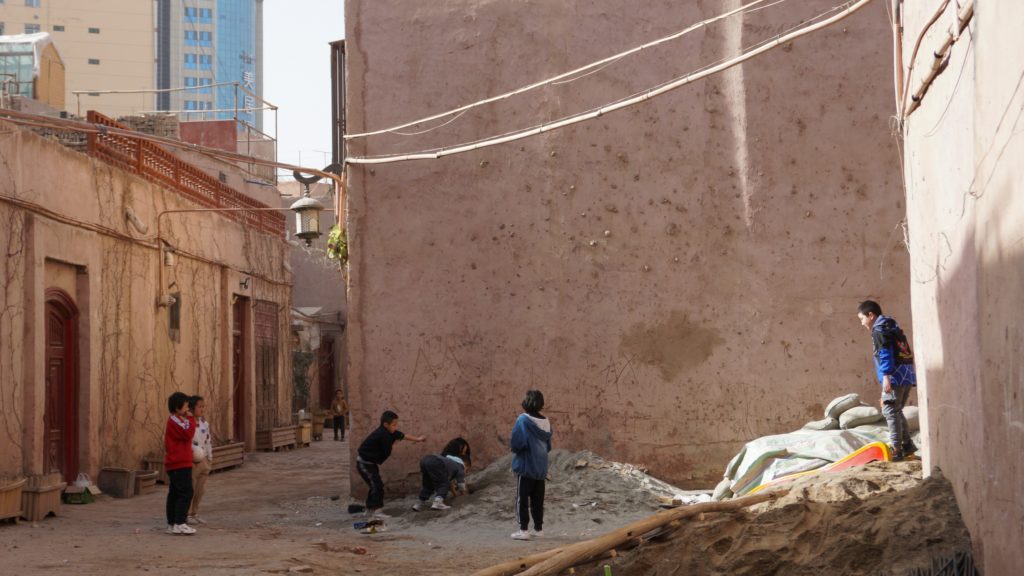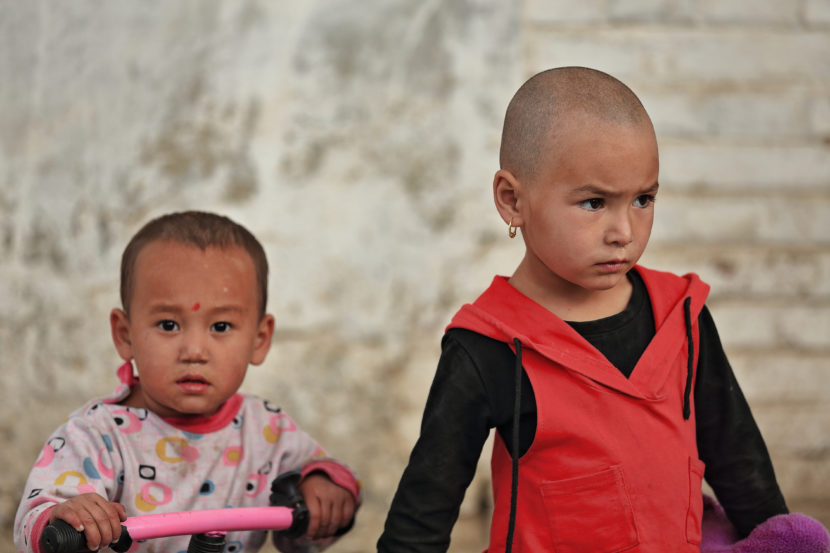Continuously outcasted due to their ethnicity and religion, the Uyghurs are now being heavily monitored, forcibly detained, mistreated, tortured and persecuted on the simple account that they belong to a Muslim minority in China. One of the most vulnerable victims of China’s enacted ethnic violence is the Uyghur children. Separated from their families and relatives, and sent to state-run institutions, the Uyghurs children are experiencing egregious human rights violations, ranging from brainwashing to physical and mental mistreatment and persecution.
The Uyghurs – an ethnic minority in China
The Uyghurs, also called ‘Weiwu’er’ or ‘Uygur’, are a Muslim and Turkic-speaking minority living essentially in northwestern China, in the Xinjiang Uyghur Autonomous Region more specifically (Britannica, 2023). Around 10,000,000 Uyghurs can be found in China, and “a combined total of at least 300,000 in Uzbekistan, Kazakhstan, and Kyrgyzstan in the early 21st century” (Britannica, 2023). The Uyghur language belongs to the Turkic group of Altaic languages, and the Uyghurs are among the “oldest Turkic-speaking peoples of Central Asia” (Britannica, 2023).
China’s discriminatory policies against the Uyghur minority
The detention and killing of the Uyghur minority by Chinese officials is unfortunately not news to the world. This has been occurring intensively, reportedly since 2017 (Council on Foreign Relations, 2022). And beyond the above-mentioned detentions and killings, the Uyghur minority of China has been subjected to “intense surveillance, forced labour, and involuntary sterilizations, among other rights abuses” (Council on Foreign Relations, 2022). The travelling documents of the Uyghurs were also confiscated from them and their children, forcing them to stay on Chinese territory (CNN, 2021).
The official reason China is providing to justify targeting the Uyghurs is related to their concern that the “Uyghurs hold extremist and separatist ideas” and they have forced the Uyghurs into the state-camps “as a way of eliminating threats to China’s territorial integrity, government, and population” (Council on Foreign Relations, 2022).
China is associating the Uyghurs with separatism, extremism and terrorism (Global Risk Insights, 2016). Simply because the Uyghurs speak a different language and practice a religion, China labelled them as a threat because of the current President Xi Jinping’s policies to conform all Chinese citizens to “the officially atheist party’s doctrines and the majority Han-Chinese society’s customs” (Council on Foreign Relations, 2022).

The religion practiced by the Uyghurs is highly regulated by China in a “detailed, intrusive and particularly controlling manner” (Office of the High Commissioner for Human Rights, 2022). Religious activities are strictly prohibited in “state institutions, schools of national education, public institutions and other places” and children are not allowed either to participate in any religious activities (Office of the High Commissioner for Human Rights, 2022). The right to choose one’s religion and the right to practice such religion freely is blatantly violated by China.
These religion-controlled policies, taken together with the various atrocious human rights violations committed by China, represent what the Uyghurs and their children suffer from, as a minority in China. And to this day, the Chinese government has “consistently denied allegations of any discrimination against the Uyghur and other predominantly Muslim minorities” living in the Xinjiang Uyghur Autonomous Region (Office of the High Commissioner for Human Rights, 2022).
China’s enacted ethnic violence
The policies adopted by China targeting and constant surveillance of the Uyghur minority, taken together with China’s will to eradicate the ethnic practices contravening President Xi Jinping’s will to conform all Chinese citizens to his doctrines, have unfolded a wave of violence and human rights violations committed against the Uyghur minority. This has led to, from 2018 onwards, many Uyghurs being forcibly sent to “Vocational Education and Training Centres” (‘VETCs’), where they are heavily guarded and are not allowed to speak their own ethnic language or practice their religion (Office of the High Commissioner for Human Rights, 2022).
They are beaten with batons, “including electric batons while strapped”, subjected to “interrogation with water being poured in their faces”, are put in “prolonged solitary confinement”, and “being forced to sit motionless on small stools for prolonged periods of time” (Office of the High Commissioner for Human Rights, 2022).
Furthermore, and alarmingly, there are accounts recounted by former detained Uyghur women that they had been raped by Chinese officials outside of their dormitories and “forced by (Chinese) guards to perform oral sex in the context of an interrogation and various forms of sexual humiliation, including forced nudity” (Office of the High Commissioner for Human Rights, 2022).
Moreover, the detained Uyghurs are forced to work within the VETCs as part of the “graduation process”, without any possibility of refusal, “for fear of being kept longer at the facilities” (Office of the High Commissioner for Human Rights, 2022). This occurs either during the placements of the Uyghurs in the VETCs, or as part of the labour placements in Xinjiang and in other parts of China, “known as ‘surplus labour’ and ‘labour transfer’ schemes” (Office of the High Commissioner for Human Rights, 2022).
The abuse suffered by the Uyghur children
Chinese policies and enacted ethnic violence have had and still have a deep impact on Uyghur families in general. The widespread arbitrary deprivation of the Uyghurs has led to many families being forcibly separated and unaware of the whereabouts of their children (Office of the High Commissioner for Human Rights, 2022). Furthermore, the Uyghur children are utmost at risk given that the Chinese government is trying to eradicate any trace of the Uyghur ethnic minority and its distinct identity, by directly targeting its younger generation (News 18, 2020).
After their parents were forcibly sent to VETCs or working facilities, many Uyghur children were sent to Chinese boarding schools in Xinjiang and some children were alternatively sent to state-run orphanages in Xinjiang (NPR, 2022; Georgetown Journal & International Affairs, 2021). They are being forcibly taught Mandarin at boarding schools and orphanages, and any child that would speak in Uyghur would be severely punished (NPR, 2022).
In addition, by 2019, it was found that around 880,500 children were forced to live in these boarding facilities (The Guardian, 2020). The Chinese government is purposely making these children ‘orphans’ by forcibly separating them from their parents, “thus allowing the state to assume a parental role” and therefore successfully breaking the family ties amongst the Uyghur minority (Melanson, 2022). Many parents nowadays cannot account for the whereabouts of their relatives and their children (Amnesty International, 2021).
The well-deserved truth and freedom for the Uyghurs
What the international community has come to know about the Uyghurs’ hardship in China is already abhorrent. What the international community still ignores, however, due to China’s constant denial and covering up of its crimes, can be even more worrisome.
For this reason, Humanium calls on the Chinese government to release all Uyghurs and its children who were arbitrarily deprived of their liberty in Xinjiang (Office of the High Commissioner for Human Rights, 2022). Humanium further calls onto the Chinese government, and the international community, to duly investigate all allegations of human rights violations that occurred in the VETCs, orphanages and boarding schools, which includes allegations of torture, sexual violence, ill-treatment and reports of deaths in custody (Office of the High Commissioner for Human Rights, 2022). Finally, Humanium calls on the Chinese government to release all its retained information on separated Uyghur families in order for them to be reunited, at last.

Humanium remains committed to safeguarding children’s human rights, including their rights to freedom, protection and a family. If you want to contribute to Humanium’s cause, please consider making a donation, volunteering or becoming a member.
Written by Moïra Phuöng Van de Poël
Bibliography:
Amnesty International. (2021, March 19). China: Parents of missing Uyghur children describe horror of family separation. Retrieved from Amnesty International at https://www.amnesty.org.au/china-parents-of-missing-uyghur-children-describe-horror-of-family-separation/, accessed in April 2023.
Britannica. (2023, March 7). Peoples of Asia – Uyghur people. Retrieved from Britannica at https://www.britannica.com/topic/Uyghur, accessed in March 2023.
CNN. (2021, March 25). Beijing’s crackdown in Xinjiang has separated thousands of children from their parents, new report claims. CNN found two of them. Retrieved from CNN at https://edition.cnn.com/2021/03/18/china/xinjiang-uyghur-families-china-amnesty-report-exclusive-dst-intl-hnk/index.html, accessed in March 2023.
Center for Strategic & International Studies. (2019, October). Connecting the Dots in Xinjiang: Forced Labor, Forced Assimilation, and Western Supply Chains. Retrieved from Center for Strategic & International Studies at https://csis-website-prod.s3.amazonaws.com/s3fs-public/publication/Lehr_ConnectingDotsXinjiang_interior_v3_FULL_WEB.pdf, accessed in March 2023.
Council on Foreign Relations. (2022, September 22). China’s Repression of Uyghurs in Xinjiang. Retrieved from Council on Foreign Relations at https://www.cfr.org/backgrounder/china-xinjiang-uyghurs-muslims-repression-genocide-human-rights, accessed in March 2023.
Georgetown Journal & International Affairs. (2021, August 17). The Uyghur Genocide through the Lens of the Child. Retrieved from Georgetown Journal & International Affairs at https://gjia.georgetown.edu/2021/08/17/the-uyghur-genocide-through-the-lens-of-the-child/#:~:text=Uyghur%20children%20whose%20parents%20are,identities%20and%20praise%20the%20CCP, accessed in March 2023.
Global Risk Insights. (2016, October 3). Special Report: Who are the Uyghurs and why do they scare China? Retrieved from Global Risk Insights at https://globalriskinsights.com/2016/10/uyghurs-scare-china/, accessed in March 2023.
Melanson, M.-È. (2022). Pathways to Statelessness and Parent-Child Separation among Uyghurs in Turkey. Retrieved from McGill University at https://bettercarenetwork.org/sites/default/files/2022-10/73-article_text-208-2-10-20220919.pdf, accessed in April 2023.
NPR. (2022, February 3). Uyghur kids recall physical and mental torment at Chinese boarding schools in Xinjiang. Retrieved from NPR at https://www.npr.org/2022/02/03/1073793823/china-uyghur-children-xinjiang-boarding-school, accessed in March 2023.
News 18. (2020, July 18). Horrors Beyond Comprehension: Disappearing Uyghur Children. Retrieved from News 18 at https://www.news18.com/news/opinion/horrors-beyond-comprehension-disappearing-uyghur-children-2722915.html, accessed in March 2023.
Office of the High Commissioner for Human Rights. (2022, August 31). OHCHR Assessment of human rights concerns in the Xinjiang Uyghur Autonomous Region, People’s Republic of China. Retrieved from Office of the High Commissioner for Human Rights at https://reliefweb.int/report/china/ohchr-assessment-human-rights-concerns-xinjiang-uyghur-autonomous-region-peoples-republic-china?gclid=Cj0KCQjw8e-gBhD0ARIsAJiDsaVDiZmY5jXO8IpWNn_1RlQOy1sdmHUmYoyYNpNjOZqleedRzXo8D2IaAvNhEALw_wcB, accessed in March 2023.
The Guardian. (2020, October 16). Chinese detention ‘leaving thousands of Uighur children without parents’. Retrieved from The Guardian at https://www.theguardian.com/world/2020/oct/16/thousands-of-uighur-children-orphaned-by-chinese-detention-papers-show, accessed in March 2023.


